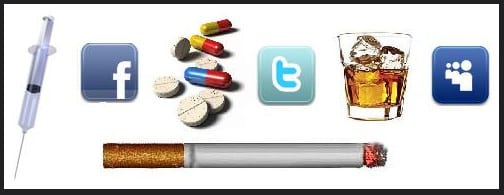 Addiction to overeating is real, and one of the most interesting things about it is how recognizable the symptoms are to anyone who has ever been addicted to (what are seen as) the harder substances, like alcohol and narcotics. Actor and comedian Russell Brand got off those things in 2003, and marked his 10-year sober anniversary by publishing an addiction memoir in The Guardian.
Addiction to overeating is real, and one of the most interesting things about it is how recognizable the symptoms are to anyone who has ever been addicted to (what are seen as) the harder substances, like alcohol and narcotics. Actor and comedian Russell Brand got off those things in 2003, and marked his 10-year sober anniversary by publishing an addiction memoir in The Guardian.
About heroin, he tells us that it erases pain, and also that the temptation to erase pain is not easily forgotten or ignored. He tells us that sobriety comes with a price, which is constant vigilance. Fair enough, but on the other hand, the life of an addict also requires constant awareness and attention. Where is the next hit coming from? How are you going to pay for it? Is there another way—like stealing it? How do you get to the stuff, or get the stuff to you? How do you keep other people from finding out?
Anyone who doubts that all addictions are basically the same is invited to search Childhood Obesity News for the term “food addict,” and marvel over the similarities revealed in the stories that real, generous, and courageous people have shared with the world.
Granted, Brand’s struggle is not an exact analogy. For most people who are not rock stars, heroin is pretty easy to stay away from. Generally, a person has to go to some trouble to have heroin delivered, or to go where the heroin is, whereas food is usually just lying around, practically within hand’s reach. Alone among possible addictors, food is ridiculously available.
Someone who sincerely wants to shun heroin can usually succeed by avoiding certain acquaintances, establishments, venues, or neighborhoods. But “refreshments” are found in all the best places—churches, schools, hospitals, business meetings, family reunions, and cruise ships among them. It is difficult to name a place where food is not present. Walk into a bank to transact some business and you may find a little arrangement of a coffeepot, disposable cups, sugar, and a plate of cookies.
Another difference is that when a person makes an offer of heroin, they want something in return—money, your death, or at the very least someone to shoot up with, because misery loves company. Conversely, people who offer food usually do it sincerely, with a loving and giving heart. It’s hard to say no to them. Brand admits that he sometimes envies his former junkie self who, regardless of what other horrors invaded his life, at least had the oblivion offered by hard drugs to fall back on. Of course this makes no sense, as any recovering addict will readily admit. There is absolutely no logic behind wanting to be an abjectly enslaved, barely-human creature whose who finds the whole meaning of life hidden in a substance. Brand writes:
The mentality and behavior of drug addicts and alcoholics is wholly irrational until you understand that they are completely powerless over their addiction and unless they have structured help they have no hope.
In that structured help lies the solution, which is, of course, to refrain from drinking or drugging, one day at a time. Brand characterizes this solution as simple but definitely not easy. Here the big difference between food and other substances is apparent. To refrain from overeating, one day at a time, is definitely not simple at all. The reason is obvious: a person can abstain from heroin or alcohol, day after day, for years and decades, until the end, and still live a perfectly full life, but nobody can abstain from food. The stark simplicity of “yes” or “no” is not available. Lines have to be drawn and redrawn every day.
Fortunately, there is a way to survive this conundrum. While a human can’t say NO to food in the same way that she or he can say NO to heroin, a compromise measure can be effectively employed. A person can give a negative answer to certain kinds of food, or to any kind of food at certain times or under defined circumstances. This is exactly what W8Loss2Go is designed for—to help people survive in the real world where total abstention from food is impossible.
No one can or should give up food entirely, of course. But the W8Loss2Go app helps a person to identify and quit problem foods, thus helping to draw the line that, in the case of heroin, alcohol, and other substances, presents itself so definitively. A person can’t say no to all food indiscriminately. But a person can absolutely say no to French fries. It’s possible to take a stand as solid and particular as the recovering alcoholic’s stand against booze. “I don’t eat French fries. Period.”
Extend that ban to include a few other problem foods, and you’ve got yourself a solid foundation to work from. “I don’t eat chips. Period.” No potato chips, no corn chips—not even quinoa chips. A ban is a ban, and the more draconian it is, the easier to stick to. The app helps a person decide what to ban, and then helps to enact that ban and make it stick. Now, let the refusal reach out and include any kind of food, if it’s not the right time of day, i.e., official mealtime. W8Loss2Go can do that, too.
Your responses and feedback are welcome!
Source: “Russell Brand: my life without drugs,” TheGuardian.com, 03/08/13
Image by Mike Licht

 FAQs and Media Requests:
FAQs and Media Requests: 











